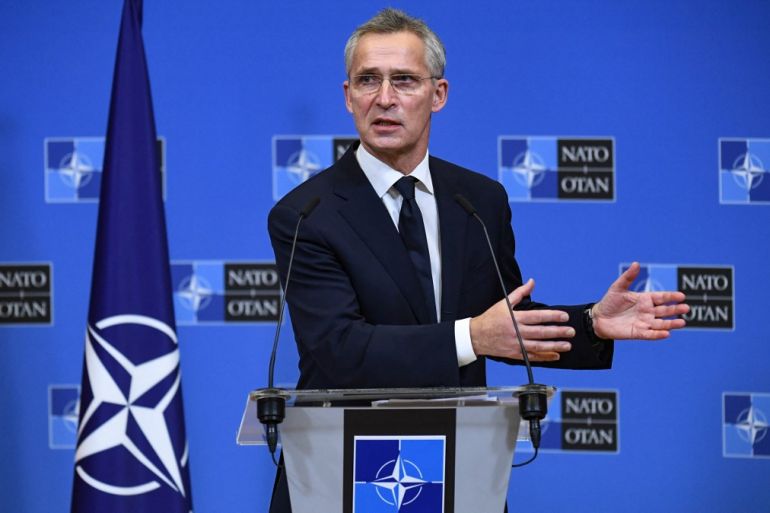NATO chief rejects Russian demand to deny Ukraine entry
Jens Stoltenberg rejected Russia’s call for the West to withdraw its invitation to Ukraine to join the military alliance.

NATO Secretary-General Jens Stoltenberg has rejected Russian demands to rescind a 2008 commitment to Ukraine that the country would one day become a member of the Western military alliance.
The remarks came on Friday after Russia’s foreign ministry said that NATO should formally scrap a 2008 declaration to grant membership to Georgia and Ukraine, two former Soviet republics.
Keep reading
list of 3 itemsCan a new conflict in Ukraine be prevented?
Biden speaks to Ukraine’s president amid Russia tensions
“NATO’s relationship with Ukraine is going to be decided by the 30 NATO allies and Ukraine, no one else,” Stoltenberg told reporters in Brussels on Friday.
Russia annexed Ukraine’s Crimea region in 2014 while allegedly supporting separatist rebels in the country’s eastern Donbas region. Russian troops also occupy two breakaway regions of Georgia.
In the past few weeks, Russia has moved about 100,000 troops to Ukraine’s border, sounding alarm bells in Washington and at NATO’s Brussels headquarters.
On Thursday, US President Joe Biden spoke with his Ukrainian counterpart Volodymyr Zelenskyy days after he spoke with his Russian counterpart Vladimir Putin. The US president urged the Russian leader to take the path of diplomacy to de-escalate the situation or face harsh economic sanctions.
During the two-hour discussion, Putin demanded that the West guarantee that Ukraine would not become a NATO launchpad.
Zelenskyy said Biden had conveyed Russian reassurances that Moscow would not cause an escalation.
On Friday, the Ukrainian president said he did not exclude holding a referendum on the future status of war-torn eastern Ukraine and the Crimea peninsula.
“I do not rule out a referendum on Donbas in general,” Zelenskyy told the 1+1 television channel. “It might be about Donbas, it might be about Crimea, it might be about ending the war in general,” he said. “So it may be that someone, this or that country can offer us certain conditions.”
‘The right to choose’
Meanwhile, the European Union on Friday warned Russia that it would face the consequences if it invaded Ukraine, as Germany’s new chancellor called for talks to resolve tensions in the wake of Moscow’s military build-up.
“Aggression needs to come with a price tag, which is why we will communicate these points ahead of time to Russia,” European Commission President Ursula von der Leyen told a joint news conference with Olaf Scholz.
Ukraine accuses Russia of preparing for a possible large-scale military offensive. The Kremlin denies planning any attack.
Earlier in the day, during a visit to France, Scholz called for a revival of the “Normandy format” talks between Germany, France, Russia and Ukraine to resolve the crisis.
“We are deeply concerned about the troops we are seeing along the Ukrainian border, and that’s why it’s important that Europe be firm in this area and show clearly that Europe’s borders are inviolable,” Scholz said at a news conference later with Charles Michel, president of the EU’s European Council.
French President Emmanuel Macron warned during his meeting with Scholz about the risk of self-fulfilling prophecies following a US intelligence assessment that a multi-front offensive on Ukraine by Russia could happen as early as next year.